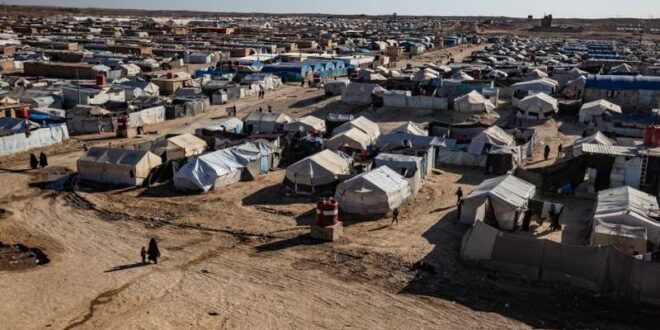Baghdad officials urge all countries with citizens held at the camp to repatriate them
Iraq has called for the closure of a Syrian displacement camp housing tens of thousands of people with suspected links to ISIS, saying that it has become a “source for terrorism”.
Al Hol camp, named after a town near the Iraqi-Syrian border, is home to people who were taken there after the extremist group’s defeat in Syria in March 2019.
“Ending the issue of Al Hol camp has become a top national interest for Iraq,” Foreign Ministry spokesman Ahmad Sahhaf said.
He called for all countries that have citizens at Al Hol to “repatriate them as soon as possible in order to eventually close the camp” because it had become “a dangerous epicentre” for ISIS gatherings.
Mr Sahhaf’s comments, reported by the official Iraq News Agency, were made during a conference in Baghdad on Monday to discuss the camp in north-east Syria. The UN representative in Iraq, members of the international coalition fighting ISIS and ambassadors of several countries were present.
Iraq has repatriated 1,396 families from the camp, consisting of 5,569 of its citizens, over the past few weeks, Iraq’s National Security Adviser Qasim Al Araji said during the conference.
Despite the repatriations, about 25,000 Iraqis remain at the camp, making up nearly half its population.
The camp holds about 51,000 people, the vast majority women and children, including the wives, widows and other relatives of ISIS members, mostly Syrians and Iraqis.
There are also about 8,000 women and children of 60 other nationalities who live in a part of the camp known as the Annex. They are generally considered the most diehard ISIS supporters among the camp residents.
There have been concerns that children at the camp were being taught extremist ideology by their mothers. Experts have warned that a future generation of ISIS fighters could emerge from the camp.
The camp’s population is down from 73,000 people, mostly because thousands of its Syrian and Iraqi inhabitants were allowed to return home. But other countries have largely balked at taking back their nationals, who travelled to join ISIS after the radical group seized large parts of Iraq and Syria in 2014.
Despite the extremist group’s defeat in Iraq in 2017 and Syria in 2019, ISIS sleeper cells still carry out deadly attacks in both countries. Over the past years, grisly crimes were committed inside Al Hol.
Earlier this month, the US-backed and Kurdish-led Syrian Democratic Forces announced it had handed over 50 Iraqi ISIS fighters to Baghdad. It also said it had repatriated 170 Iraqis who were living at the camp.
The Kurdish-led authority in north-east Syria has been urging countries to repatriate their citizens from the camp for years.
 Eurasia Press & News
Eurasia Press & News




